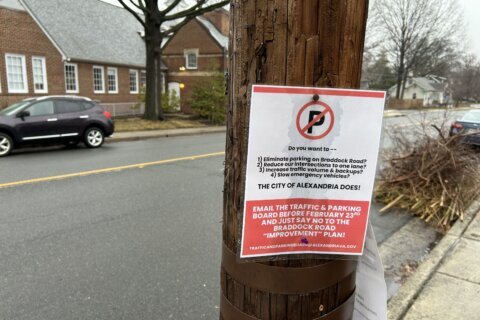WASHINGTON — The private guards, like those guarding a prisoner who escaped from Inova Fairfax Hospital Tuesday, don’t require the same amount of training as the U.S. Marshals whose shoes they were filling.
Wossen Assaye escaped after overpowering a guard and hijacking a car. After a nine-hour manhunt he was taken into custody in Southeast D.C.
While new deputy marshals are required to undergo a “rigorous 17 ½ week basic training program” at the agency’s training academy in Georgia, the private security contract awarded in the Eastern District of Virginia only requires that the guards have “sufficient” training and orientation.
When reached by WTOP on Wednesday, a man who answered the phone at the Los Angeles-based company referred all questions about the guards in this case back to the Marshals, then hung up when asked about the company’s standard training policies.
The company has hundreds of thousands of dollars in federal contracts across the country, and its contract in the Eastern District of Virginia has several individual option years remaining after the current award ends this fall.
Some of the contract’s requirements for guards are:
- They must have sufficient control of the prisoner to prevent escape
- Prisoners in regular hospital rooms should be kept in leg irons
- Guards must immediately notify marshals if an inmate does escape.
- Guards must have three years of experience
- At least one of the two guards should be the same gender as the prisoner
Separate clauses require guards be tested annually for weapons handling proficiency, and that each have a Virginia license to serve as an armed guard.
According to Virginia’s Department of Criminal Justice Services, the requirements to register include 50-53 hours of training including core subjects and gun training. Renewing the license every two years requires six to eight hours of in-service training.
The contract awarded by the Marshals Service to Allied Protection Services requires guards work in pairs other than in exceptional circumstances. Each needs a minimum of three years “full time security, law enforcement, corrections officer or military police experience monitoring detainees and dealing with security matters related to prisoner handling and detention of prisoners on a regular basis.”
A Marshals Service spokesman says 12 of the 94 districts have similar contracts. He says the other closest district to the Washington area that uses the private guards is in Pennsylvania.
The Marshals have used similar contracts for at least a decade. The last audit of any part of the contract guard program appears to have been in May 2005, when the Justice Department Inspector General’s Office found problems with procurement policies for individual independent contractors.
Under the Virginia contract, which covers services from Northern Virginia to Norfolk, the guards must be 21 or older, and “be emotionally stable with no past history of emotional or mental illness.” The contract requires that supervisors check in on each pair of guards at least once per shift.
While the guards can’t have a history of medical problems that might impede their duties, the contract doesn’t say they must be in “excellent physical condition.” That is a requirement, however, for the U.S. Marshals.
The company is required to run background, criminal history and credit checks on its private guards.
U.S. Marshal Bobby Matthieson says his office is reviewing how Assaye escaped, whether any policies were broken and whether the service should handle prisoner security differently.







